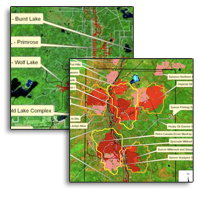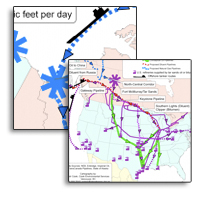Tar Sands 101
The Tar Sands "Gigaproject" is the largest industrial project in human history and likely also the most destructive. The tar sands mining procedure releases at least three times the CO2 emissions as regular oil production and is slated to become the single largest industrial contributor in North America to Climate Change.
The tar sands are already slated to be the cause of up to the second fastest rate of deforestation on the planet behind the Amazon Rainforest Basin. Currently approved projects will see 3 million barrels of tar sands mock crude produced daily by 2018; for each barrel of oil up to as high as five barrels of water are used.
Human health in many communities has seriously taken a turn for the worse with many causes alleged to be from tar sands production. Tar sands production has led to many serious social issues throughout Alberta, from housing crises to the vast expansion of temporary foreign worker programs that racialize and exploit so-called non-citizens. Infrastructure from pipelines to refineries to super tanker oil traffic on the seas crosses the continent in all directions to allthree major oceans and the Gulf of Mexico.
The mock oil produced primarily is consumed in the United States and helps to subsidize continued wars of aggression against other oil producing nations such as Iraq, Venezuela and Iran.
To understand the tar sands in more depth, continue to our Tar Sands 101 reading list
Indigenous Environmental Network press release on Obama's visit to Canada
- Alberta (& Saskatchewan) Tar Sands
- Enbridge Gateway Pipeline/ Offshore Tanker Traffic [BC]
- Mackenzie Gas Project / Alaska Highway pipelines [NWT/AK]
- Tarsands Infrastructure: South/ East [US & Can]
- International oil & gas
- Animals
- Climate Change / Emissions
- Energy
- Forests
- Health
- Indigenous
- Land
- Social Impacts
- Water
*Ottawa, Canada, February 19, 2009 –* United States President Barack Obama
is meeting today with Prime Minister Stephen Harper of Canada for his first
foreign visit as a President. The main discussion will center on trade
between the two nations as well as topics of environment, climate and energy
security in North America. Obama's concerns about implementing an agenda for
a clean and green energy economy highlights' Canada's oil sands, a vast
potential oil source that comes at a big cost to the environment and the
NASA's Hansen concerned about Canada's tar sands
INTERVIEW-
NASA's Hansen concerned about Canada's oil sands
Wed Feb 18, 2009 5:41pm GMT
By Deborah Zabarenko, Environment Correspondent
WASHINGTON, Feb 18 (Reuters) - Canada's oil sands are an environmental "wild card," NASA's James Hansen said in an interview before President Barack Obama's trip to Ottawa, where energy and climate change will be on the agenda.
As director of the U.S. space agency's Goddard Institute for Space Studies in New York City, with a focus on climate change, Hansen has long opposed the burning of oil, gas and coal for their contribution to global warming.
Canada’s Tar-Sands Oil Can Be ‘Clean,’ Obama Says
Canada’s Tar-Sands Oil Can Be ‘Clean,’ Obama Says
By Jim Efstathiou Jr.
Feb. 18 (Bloomberg) -- Oil extracted from tar sands in Canada can be made a clean energy source, and the U.S. will work with its northern neighbor to develop the technology, President Barack Obama said.
Uranium Mning: Funding encourages Baker Lake residents to comment on Areva proposal
Funding encourages Baker Lake residents to comment on Areva proposal
Last Updated: Monday, February 16, 2009
CBC News
Some last-minute funding helped about 70 people in Baker Lake, Nunavut, give a regulatory board their thoughts on a uranium mine proposal in the area.
The proposal by Areva Resources Canada Inc. is undergoing a screening by the Nunavut Impact Review Board. The board has extended its deadline for accepting public comments to Feb. 18, at the request of the territorial government.
Tar sands producers gird for Obama’s Canada visit
Oilsands producers gird for Obama’s Canada visit
By Ayesha Rascoe, Reuters
February 17, 2009
WASHINGTON -- Canada’s oilsands industry, battered by collapsing oil prices, also faces the prospect of ballooning costs as the United States and Canada prepare to discuss energy security and efforts to fight global warming.
When U.S. President Barack Obama visits Ottawa Thursday, energy will be a key topic in his talks with Canada Prime Minister Stephen Harper, who often touts Canada as an emerging energy superpower due to its massive oilsands resources.
Dirtier tar sands Coming
Dirtier oil sands Coming
By SHAWN BELL, SRJ Reporter 17.FEB.09
The Alberta government has tried sneaking through a policy allowing the oilsands to get even dirtier, according to the Pembina Institute, an Alberta environmental think-tank.
The new policy allows in-situ oilsands operations to burn bitumen, petroleum coke or asphaltenes instead of natural gas to produce steam, processes that increase air emissions by 40 to 66 per cent. The policy was posted to the Alberta Environment website on Dec. 23, 2008, with a deadline for public feedback set for Feb. 13, 2009.
DANGER: Mackenzie Pipeline one step closer
MacKenzie Pipeline one step closer
Tuesday, February 17, 2009
Backers of a proposed natural gas pipeline down the Mackenzie Valley in the Northwest Territories have received some good news.
Imperial Oil has worked out a tentative deal on land access with the one remaining aboriginal stake holder not yet on board. The deal still has to be ratified by Dehcho First Nation communities, which cover about 40 per cent of the pipeline's route, in the southwest corner of the terriroties.
Dirty Tar Sands in Canada to Test Obama Green Goals
Dirty Tar Sands in Canada to Test Obama Green Goals
By Jim Efstathiou Jr.
Feb. 17 (Bloomberg) -- Petroleum extracted from tar sands in Canada may provide the first foreign-policy test for President Barack Obama’s environmental agenda.
U.S. and Canadian conservationists have called on Obama to reject any bid to exempt the oil from proposed climate-protection rules when he visits Canada Prime Minister Stephen Harper this week in Ottawa, his first meeting with a head of government.
Work on Keystone pipeline scheduled to begin mid-May
Work on Keystone pipeline scheduled to begin mid-May
Associated Press • February 16, 2009
YANKTON – Work on the TransCanada Keystone oil pipeline in southeast South Dakota is expected to begin in mid-May with several hundred workers using Yankton as construction headquarters for much of the year.
Advertisement
Spokesman Jeff Rauh says they’ll start in Hutchinson County and work their way south about 130 miles into Nebraska.
The initial work will be locating and marking buried utilities. Other crews will remove topsoil, bury and weld the pipe, and inspect it.
Prentice 'optimistic' Mackenzie gas project will begin soon
Prentice 'optimistic' gas project will begin soon
Updated Sun. Feb. 15 2009 1:11 PM ET
CTV.ca News Staff
Environment Minister Jim Prentice says he is "optimistic" that work on the controversial Mackenzie Gas Project, which proposes building a pipeline to deliver northern natural gas to Canadian and U.S. markets, will begin soon after numerous delays for environmental and community assessments.
The project was first proposed in 2001 by a consortium of oil producers that includes Imperial Oil, ExxonMobil Corp., Shell Canada and ConocoPhillips.



